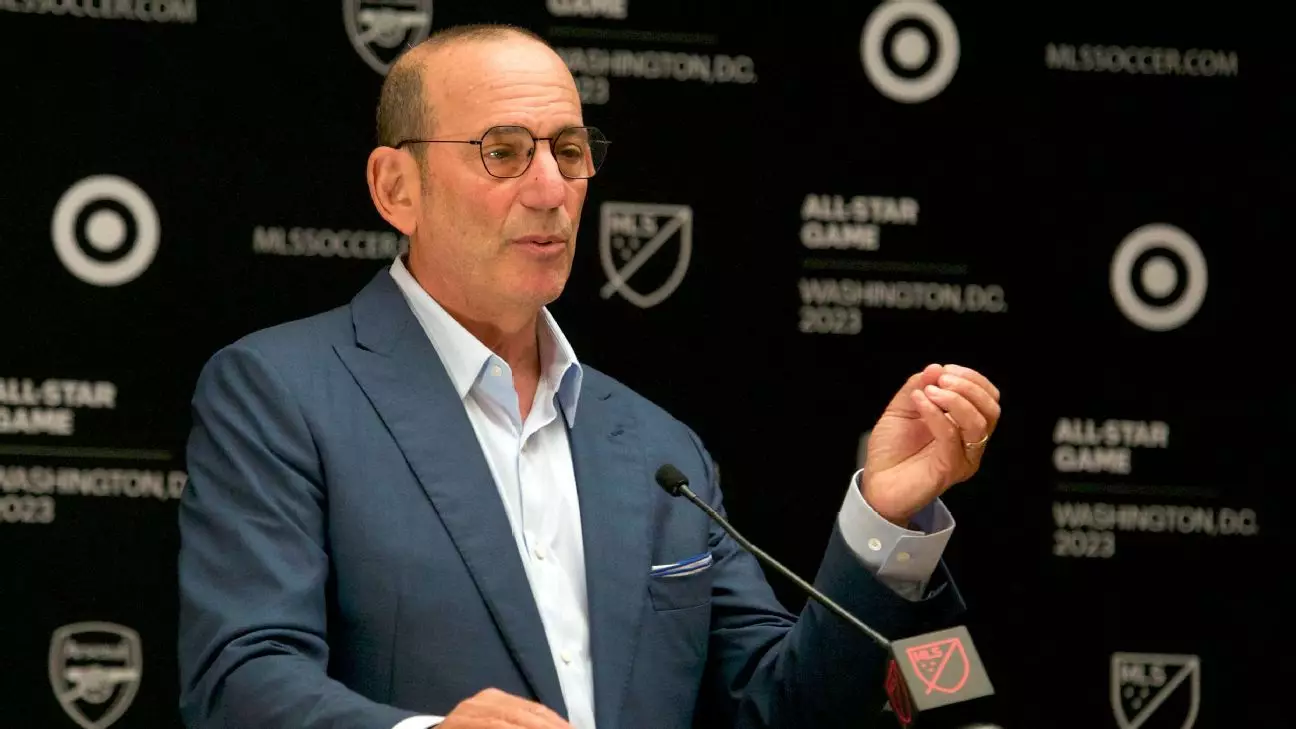In recent weeks, the conversations revolving around the congested football calendar have intensified, especially in light of the antitrust lawsuit lodged with the European Commission. Major League Soccer (MLS) President Don Garber has posited that this lawsuit may serve as a pivotal moment for evaluating and restructuring the global football schedule. LaLiga President Javier Tebas also added his voice to the debate, arguing for the cancellation of FIFA’s proposed 2025 Club World Cup, which, despite its lofty ambitions, currently lacks essential sponsorship and broadcasting agreements. This dialogue suggests a tipping point for the future of the sport, where collaboration and consensus may be necessary to ensure the well-being of players and the integrity of the game.
Garber acknowledged the growing concern regarding the impending influx of tournaments, specifically highlighting the revamped 32-team Club World Cup slated to unfold in the United States. His warnings about potential oversaturation underscore the fears shared by many in the football community, especially as the proposed Club World Cup emerges alongside an expanded UEFA Champions League and an enlarged World Cup in 2026. The relentless pace at which competitions are being added seems to be reaching a critical mass, overwhelming players who already face the debilitating pressures of their annual schedules.
The sheer volume of fixtures has drawn ire from players, some of whom have expressed serious considerations for strike actions over the dilapidated structure of the international match calendar. Such sentiments come forth not merely as grumbles of exhaustion but as earnest pleas for structural changes, demonstrating the need for decision-makers to take radical steps to safeguard players’ health and the integrity of competitions.
One illuminating aspect of Garber’s perspective is his belief that, amid such turmoil, there exists a unique opportunity for restructuring. “Sometimes it takes a little disruption,” he stated, hinting that such lawsuits encourage all stakeholders to convene and deliberate on pressing issues. The collective need for reform could potentially be catalyzed by current legal disputes that underline the necessity for data-driven decisions rooted in thorough research and strategic foresight.
Garber’s call for stronger governance and participation in the decision-making process is echoed by many observers and participants within the football ecosystem. He emphasized that all parties, including league authorities and player unions, need to be actively involved as stakeholders in conversations surrounding tournaments like the Club World Cup. This approach might yield a more sustainable and ethical operational framework, balancing the varied interests and demands of different factions.
Concurrently, the implications of a new tournament landscape cannot be ignored as FIFA prepares for the Club World Cup. With concerns mounting regarding the implications of juggling the Club World Cup, Concacaf’s Gold Cup, and the launch of the Major League Soccer season, the potential for player fatigue and injury has reached a critical juncture. The tight scheduling may threaten player participation in major tournaments and leagues, creating a domino effect that could destabilize future competitions.
Gerard Piqué, once a defender for Barcelona and now a vocal advocate for better football governance, encapsulated these sentiments poignantly, underscoring the multitude of games played and the pressing need for a reduction in fixture congestion. His suggestions for reconfiguring leagues into smaller units reflect a broader sentiment among many that less may indeed be more. This reduction could provide players with necessary rest periods and lessen the toll of frequent competitions, while also fostering a more competitive landscape.
As discussions evolve around the international match calendar, decision-makers should not overlook the significance of this period for potential reform. While criticism from players and league executives alike continues to mount, it also brings forth the possibility of meaningful change. Ensuring that player welfare takes precedence over commercial profit must become an integral part of the conversation moving forward.
Adapting the structure of leagues and tournaments, prioritizing collaboration between governing bodies, and focusing on player health could set the tone for a future where football remains both competitive and sustainable. If stakeholders seize this moment responsibly, they have a rare chance to create a harmonious football ecosystem that not only respects players’ rights but also paves a viable pathway for the sport’s growth and evolution on the global stage.

Leave a Reply